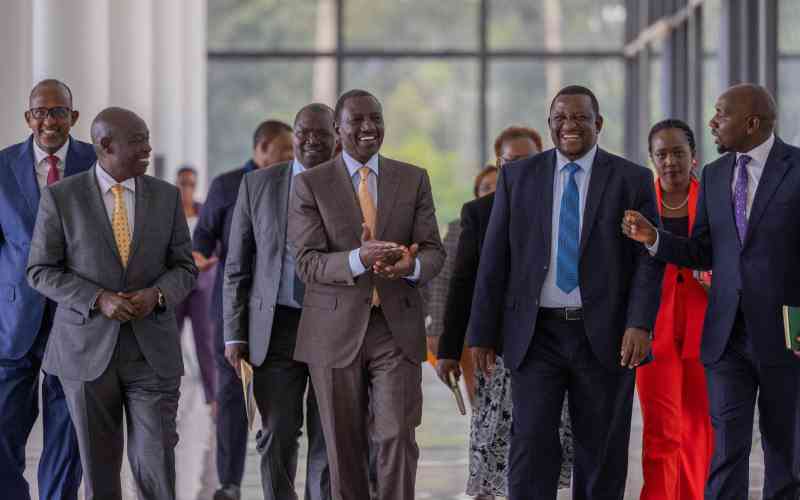Last week, Kenya hosted a pan-African Conference on Violent Extremism (CVE), which dealt with formulating joint responses to fighting one of the key challenges of our time. One critical question was: what to do with the youth bulge.
By demography, the 'youth bulge' is the reality of our time. On the one hand, large numbers of young people furnished with economic opportunity, and that buy into the Kenyan dream, present immeasurable potential for growth. On the other hand, if not well managed, a large number of idle, frustrated youth pose significant risk for the survival of the State. They can be drawn to ideologies that undermine the legitimacy of the State and can be used to destroy our democratic dispensation.
Kenya is beginning to change the tide. We have begun to see pre-emptive arrests of those involved in luring our children to fall prey to radicalisation over promises of economic benefits for themselves or their families. Jihadists such as those who were recently killed as they attempted to attack a military barracks at the Coast exposed the vulnerability of our youths to radicalisation, in addition to youths who engage in cattle rustling for economic benefit or as a traditional sport.
The trend has been alarming. Kenya must, therefore, factor its youth into all national security considerations, programmes, strategies and implementations. Needless to say, the youth are the nation and the country's future. Kenya has never had more youth alive at the same time since the beginning of time. It therefore follows that the youth have the largest stake – the future – in how national security policy and strategy are rolled out.
The youth's stake in a prospering and secure Kenya is so tremendous and so vitally important that it can be described as existential. The youth bulge is a demographic description by the President Uhuru Kenyatta of youth who are between 18 and 30. A nation's young is its greatest asset and the youth of all nations are mankind's future and therefore the future of both the race and the planet, the biosphere.
The national security threats that Kenya faces in this first quarter of the 21st century are unprecedented in this country. They also call for factoring in the youth and their interests, hopes, fears and great expectations for the future of this country. More than ever before, therefore, Kenya's national development policy and strategy as appertains to the youth must contain a substantive security dimension designed specifically for the youth.
Among other things, alongside adolescent and young adult sexual and reproductive health rights, facilities and services, the Jubilee Administration must introduce national security initiatives and services that address youth needs and requirements, including in vocational training and education. There are strategic plans in all government ministries and sectors; their youth component must include national security roll-outs tailored for the youth and addressing such critically important areas as counter-terrorism, counter-narcotics, illicit small arms and human trafficking.
The president himself deserves commendation for the deliberate initiatives he has committed his Government to implement for the youth. One of the first projects he carried out as President for ensuring Youths Enterprise Development Fund adequate funding to assist young people in entrepreneurship.
Reports indicate the Fund has so far financed over 157,000 youth enterprises to the tune of Sh5.9 billion. Many of the youths the Fund supported at inception are today big employers. It has also helped thousands of youth build their enterprises through market support and entrepreneurship training. The Fund has trained over 200,000 young entrepreneurs. It has also supported thousands of youth to take up jobs overseas through the Youth Employment Scheme Abroad (YESA) programme.
The President's unrivalled support for the youths has manifested at the National Youth Service as well. The service is implementing new programmes that will churn out 20,000 graduates every three months. It means in two years, they will have the same number of graduates as the total number of graduates since independence!
They will be deployed in various development projects across in sectors such as water provision in ASAL areas, road construction, mechanical engineering works and revenue collection, among others. As these noble initiatives take root, the encounter and interface between the youth and all manner of non-governmental organisations must be constantly monitored for national security factors such as radicalisation and cultural mores that are inherently anti-social in Kenya's mainly African context. Remember, eternal vigilance is the price of liberty.
To their efforts and programmes specifically aimed at children, the youth and women, Jubilee must add a programme emphasising national security priorities for these vulnerable demographics. There are many cross-cutting issues when it comes to matters of the youth and national security, which are essentially matters of peace and security.
National security does not mean only the policing and military functions, or the cloak-and-dagger world of criminal, espionage, military, industrial and digital intelligence, or spying. National security also embraces and protects environmental sustainability, the very biosphere itself, the cradle and vessel of all life – Man, animal, plant, you name it.
Going forward, Kenya's national security managers and commanders must ensure they mainstream and prioritise youth issues. The public sector must include the youth of Kenya, especially young women, in both national and devolved security strategies and programmes, and so must civil society, private sector corporations and such international and/or global development agencies as the ones mentioned above, and many others.
Stay informed. Subscribe to our newsletter
 The Standard Group Plc is a
multi-media organization with investments in media platforms spanning newspaper
print operations, television, radio broadcasting, digital and online services. The
Standard Group is recognized as a leading multi-media house in Kenya with a key
influence in matters of national and international interest.
The Standard Group Plc is a
multi-media organization with investments in media platforms spanning newspaper
print operations, television, radio broadcasting, digital and online services. The
Standard Group is recognized as a leading multi-media house in Kenya with a key
influence in matters of national and international interest.
 The Standard Group Plc is a
multi-media organization with investments in media platforms spanning newspaper
print operations, television, radio broadcasting, digital and online services. The
Standard Group is recognized as a leading multi-media house in Kenya with a key
influence in matters of national and international interest.
The Standard Group Plc is a
multi-media organization with investments in media platforms spanning newspaper
print operations, television, radio broadcasting, digital and online services. The
Standard Group is recognized as a leading multi-media house in Kenya with a key
influence in matters of national and international interest.







